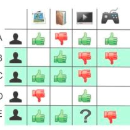Collaborative filtering (CF), as a standard method for recommendation with implicit feedback, tackles a semi-supervised learning problem where most interaction data are unobserved. Such a nature makes existing approaches highly rely on mining negatives for providing correct training signals. However, mining proper negatives is not a free lunch, encountering with a tricky trade-off between mining informative hard negatives and avoiding false ones. We devise a new approach named as Hardness-Aware Debiased Contrastive Collaborative Filtering (HDCCF) to resolve the dilemma. It could sufficiently explore hard negatives from two-fold aspects: 1) adaptively sharpening the gradients of harder instances through a set-wise objective, and 2) implicitly leveraging item/user frequency information with a new sampling strategy. To circumvent false negatives, we develop a principled approach to improve the reliability of negative instances and prove that the objective is an unbiased estimation of sampling from the true negative distribution. Extensive experiments demonstrate the superiority of the proposed model over existing CF models and hard negative mining methods.
翻译:合作过滤(CF)是提出隐含反馈建议的一个标准方法,它解决了半监督的学习问题,因为大多数互动数据都得不到观察。这种性质使得现有办法高度依赖采矿负面因素来提供正确的培训信号。然而,适当的采矿负面因素不是免费午餐,而是采矿信息丰富的硬反面因素和避免假反面因素之间的微妙权衡。我们设计了一种新的办法,称为Hardness-Aware Debeatsed Contractic Company过滤(HDCCF)来解决这一难题。它可以充分探讨两方面的硬反面因素:1)通过设定目标,使较困难情况的梯度适应性提高;2)以新的抽样战略隐含地利用项目/用户频率信息。为避免错误负面因素,我们制定了原则性办法,以提高负面事例的可靠性,并证明目标是对真实负面分布的抽样进行不偏袒的估算。广泛的实验表明拟议模式优于现有的CFF模型和硬负面采矿方法。



